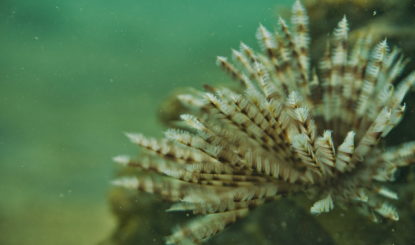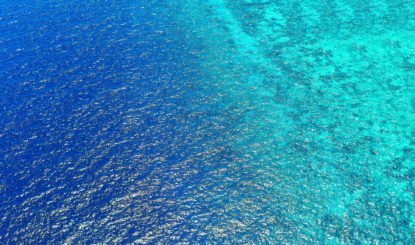Gran Seaflower 2021: A Spark of Hope in The Caribbean
In early 2021, seasonal tropical storms hit the Caribbean with unprecedented force, significantly devastating the region. However, this climate-related natural tragedy represents an opportunity for the “Gran Seaflower” campaign initiated by Fondation Franz Weber – for the protection of the ecosystem and biodiversity.
The beginning of 2021 was marked by reconstruction for the coastal and island regions in the southwestern Caribbean: the seasonal tropical storms caused great damage in the individual regions. Governments brutally realized that they could now no longer turn a blind eye to the social ills and environmental conditions of Afro-Caribbean communities. In this regard, recent developments have become a driver that could give a powerful boost to the protection of local coral reefs and the related Gran Seaflower initiative: Now that we at FFW have the attention of local governments, our position in the region has been strengthened, allowing us to make several significant advances.
Historic victories
The year 2021 started with promise in the tropics. In the border conflict with Colombia, the International Court of Justice in The Hague (2012) had granted Nicaragua sovereignty over a certain water zone. In February 2021, the National Assembly of Nicaragua declared this area a biosphere reserve. In terms of the Gran Seaflower initiative, this declaration represents two victories for Fondation Franz Weber. First, it shows that the main argument of the foundation had been institutionally underpinned: From now on, it is officially recognized that the coral reef Seaflower by no means is the property of one single state, not even legally. Another significant progress: thanks to the dialogue initiated by Fondation Franz Weber under the guidance of former Colombian President Ernesto Samper, the Nicaraguan government has finally recognized that the UNESCO biosphere reserve model is the best way to restore and manage the Seaflower coral reef ecosystem.
A beautiful breakthrough
For Colombia, which until now has acted poorly by not recognizing The Hague’s judgement for more than three years and insisting on “defending the sovereignty of Seaflower” to neighbouring countries, this declaration is a challenge. Following Nicaragua’s legislative decision, it became very clear that the Colombian government was already paying close attention to the Seaflower initiative and had also adopted various terms, such as “Western Caribbean” or “transboundary management of the protected area,” which was unprecedented in Colombia. Colombian foreign policy has indeed changed its view, from total rejection to a possible recognition of the judgment, with the option of peaceful dialogue with Nicaragua.
Joint actions
During this progress, the Fondation Franz Weber team managed to obtain – for the first time in 30 years – a joint declaration of the island population of San Andrés, Providencia and Santa Catalina. The declaration includes an action alliance between the different representatives of the islands. They implore the Colombian government to engage in dialogue not only with Nicaragua, but also with the other neighbouring countries of Seaflower. The communication signed by the relevant authorities is even more impactful because it was publicised by Colombia’s main media. The response was correspondingly great.
Following the publication and translation of the document, made possible by Fondation Franz Weber, the Colombian Foreign Ministry contacted the island representatives to ask them to officially submit the Gran Seaflower initiative to Vice Minister Francisco Echeverri.
First visit under President Iván Duques
Thanks to FFW’s facilitation, island spokespersons Graybern Livingston and Kent Francis traveled to Bogota for a diplomatic tour focused on the environmental degradation of the archipelago. This is the first trip in two years and, above all, the first under President Iván Duques! Among their priorities were: a meeting with the Colombian Ministry of Foreign Affairs, a meeting with university professors and influential personalities who support the “Gran Seaflower” initiative, a visit to the Second Commission of the Senate of the Republic, and a tour of the national media.
Although the communication of the island’s people was published in the media before the meeting with the Ministry of Foreign Affairs, the meeting proved to be very positive, especially because the young Colombian government expressed its will to maintain peaceful relations with Nicaragua. In the presence of FFW’s Colombian representative, Mateo Córdoba, the two delegates from the islands were able to present the key points of the “Gran Seaflower” project to a supporting audience and raise awareness about the initiative’s international appeal.
Good will
On the executive side, the objective was also achieved. Echeverri, Vice Minister of Foreign Affairs, expressed full agreement with the planned course of action. He also agreed that arrangements should continue to be made at the international level to create the necessary conditions for dialogue between neighbouring countries. In addition, he stressed that the Colombian state and its embassies in the Caribbean were ultimately in favour of seeking a peaceful solution to the conflict – which includes a joint administration of the marine ecosystems.
Negotiation on San Andrés
In Congress, the island delegation was also well received during an official presentation of the initiative during a meeting of the Second Commission of the Senate, which is in charge of foreign affairs at the legislative level. After this presentation, prepared jointly by Fondation Franz Weber and the islanders, the commission – including the senators of the ruling party – unanimously approved the holding of a public hearing on San Andrés Island. This is to address only the issues related to a possible transboundary administration of Seaflower. Hence, finally there is an official agreement with the Colombian authorities to hold a public negotiation in June 2021, during which Fondation Franz Weber will present to high-level decision-makers of the Colombian government.
International mobilization
It’s obvious that the FFW team has been anything but idle during the second half of 2021. The broad support and declarations at the international level exemplify the nature of the Gran Seaflower regional initiative. The issue is gaining momentum and this generates a ripple effect far across the oceans of the world. In the Spanish Senate, Senator Sara Vilà (Izquierda Confederal, IC) has formulated a written request to the government. This will be taken up by the Ministry of Ecological Change and Demography, which will certainly mention in particular the initiative “Gran Seaflower”. Following this progress, it is planned to submit a request for support to the Spanish Senate. The first negotiations between the group making the request (IC) and the other parliamentary groups, suggest that it will get the support of the majority – even if it has still not been officially debated.
At the Spanish Congress, deputy Juan López de Uralde (Unidas Podemos-En Comú Podem- Galicia en Común, UP-ECP-GeC) was able to submit a request to the government. He received a public response from the Ministry of Ecological Change and Demography, which in turn indicates a great interest of the Spanish government to support the Gran Seaflower initiative.
Political relationship with Spain
Another direct communication with the Spanish government was also established through the Secretariat of State for the 2030 Agenda. After its directorate expressed interest, it asked for a few weeks to evaluate what would be the best form to advance the initiative “Gran Seaflower” in the framework of the 2030 Agenda – an instrument designed to implement sustainable development goals. Some of the fundamental principles of “Gran Seaflower” are indeed reflected in the goals of the Agenda, which makes the initiative particularly interesting for Madrid. This provides confidence that a political relationship with the Spanish state is emerging. This is all the more important because historically Spain exerts political influence on the government of Colombia.
Direct exchange with the USA
The “Gran Seaflower” initiative is not limited to the Latin countries: in the European Parliament, MEPs Ernest Urtasun (Verdes/Ale), Idoia Villanueva and Manuel Pineda (La Izquierda) have asked the European Commission for a satisfactory response from the Lithuanian European Commissioner for Environment, Seas and Fisheries, Virginijus Sinkevičius. In Washington, on 11 May 2021, the United States Congress also took an interest in the Gran Seaflower initiative and its feasibility for implementation on land and people. At a meeting, Congressman Jim McGovern, chairman of the Congressional Human Rights Commission, alluded to the delayed reconstruction announced by the Colombian government on the island of Providencia following Hurricane IOTA in November 2020. McGovern mentioned in particular the island population and their historical connection with the Afro-Caribbean communities of other countries in the Caribbean. A point that is a key argument of the FFW.
This is an important step as it sets the stage for the direct exchange between the U.S. Congress and the Gran Seaflower initiative mediated by Ernesto Samper. With these initial successes, we look forward to this relationship becoming a reality in the coming weeks.
More information:
- Our project page “Gran Seaflower”
- This article was first published in the Journal Franz Weber 136. You can find the PDF version of all previous magazines here.
- You have not yet subscribed to our quarterly magazine, the Journal Franz Weber? Order the latest issue for free here (in German and French only).


